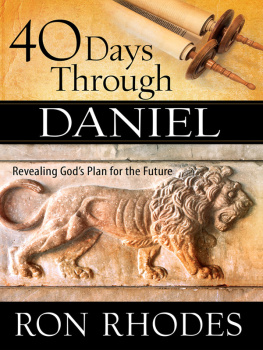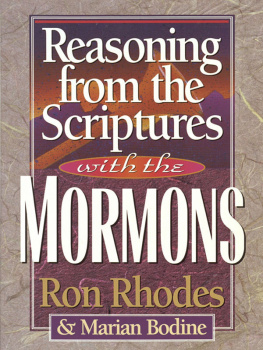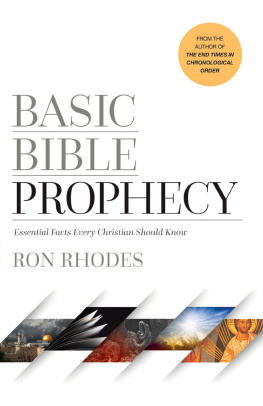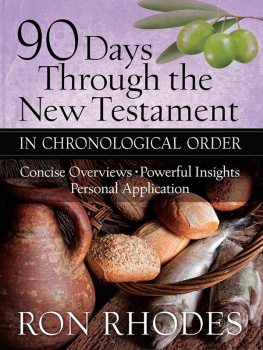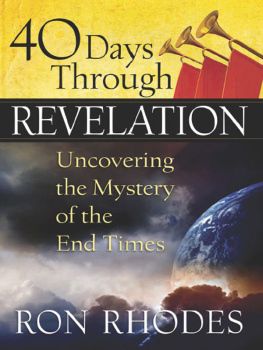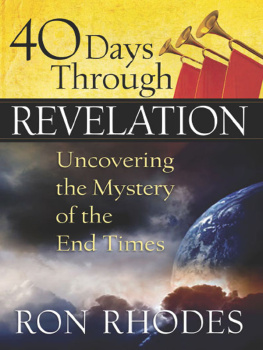

HARVEST HOUSE PUBLISHERS
EUGENE, OREGON
Unless otherwise indicated, all Scripture quotations are from The ESV Bible (The Holy Bible, English Standard Version), copyright 2001 by Crossway, a publishing ministry of Good News Publishers. Used by permission. All rights reserved.
Verses marked NLT are taken from the Holy Bible , New Living Translation, copyright 1996, 2004, 2007, 2013 by Tyndale House Foundation. Used by permission of Tyndale House Publishers, Inc., Carol Stream, Illinois 60188. All rights reserved.
Verses marked NASB are taken from the New American Standard Bible, 1960, 1962, 1963, 1968, 1971, 1972, 1973, 1975, 1977, 1995 by The Lockman Foundation. Used by permission. (www.Lockman.org)
Verses marked HCSB are taken from the HCSB, Copyright 1999, 2000, 2002, 2003, 2009 by Holman Bible Publishers. Used by permission. HCSB is a federally registered trademark of Holman Bible Publishers.
Verses marked NIV are taken from the Holy Bible, New International Version, NIV. Copyright 1973, 1978, 1984, 2011 by Biblica, Inc. Used by permission. All rights reserved worldwide.
Italicized emphasis in Scripture quotations is added by the author.
Cover by Dugan Design Group
Cover photo JannHuizenga / Shutterstock
40 DAYS THROUGH DANIEL
Copyright 2016 Ron Rhodes
Published by Harvest House Publishers
Eugene, Oregon 97402
www.harvesthousepublishers.com
Library of Congress Cataloging-in-Publication Data
Rhodes, Ron.
40 days through Daniel / Ron Rhodes.
pages cm
Includes bibliographical references.
ISBN 978-0-7369-6445-6 (pbk.)
ISBN 978-0-7369-6446-3 (eBook)
1. Bible. DanielDevotional use. I. Title. II. Title: Forty days through Daniel.
BS1555.54.R46 2016
224.506dc23
2015017105
All rights reserved. No part of this electronic publication may be reproduced, stored in a retrieval system, distributed, or transmitted in any form or by any meanselectronic, mechanical, digital, photocopy, recording, or any otherwithout the prior written permission of the publisher. The authorized purchaser has been granted a nontransferable, nonexclusive, and noncommercial right to access and view this electronic publication, and purchaser agrees to do so only in accordance with the terms of use under which it was purchased or transmitted. Participation in or encouragement of piracy of copyrighted materials in violation of authors and publishers rights is strictly prohibited.
To my beloved wife, Kerri
After I became a Christian, I read one prophecy book after another. I could not get enough.
At the time, I seemed to gravitate toward prophecy books written by professors at Dallas Theological SeminaryJohn F. Walvoord, J. Dwight Pentecost, Charles Ryrie, and others. I found their books to be intelligently and persuasively written. Their words about the prophetic future, based on the Bible, resonated with me.
Little did I know then that in the not-too-distant future, I would actually enroll at Dallas Theological Seminary and take courses under these men, obtaining master of theology and doctor of theology degrees. As I now write about the prophetic book of Daniel, I want to acknowledge my personal indebtedness to these godly teachers of the Word. Their work continues to bear fruit in my life.
I also want to offer continued praise and thanksgiving to God for the wonderful family He has blessed me withmy wife, Kerri, and my two grown children, David and Kylie. With every year that passes, I grow in affection and appreciation for these three.
Thank You, Lord! I am grateful.
Contents
Thank you for joining me in this exciting journey through the book of Daniel. You are in for a spiritually uplifting time! My hope and prayer is that as you read 40 Days Through Daniel , you will experience several significant blessings:
an awareness that God is a personal being who personally interacts with His people
a conviction that God blesses righteous living
an understanding of the need for Gods people to maintain faith in Him regardless of the outward circumstances
an understanding of Gods sovereignty and control over the events of human history, including not only kings and nations but also the specifics of each of our individual lives
an awareness that God will one day providentially cause good to triumph over evil
an awareness that God is now providentially guiding human history toward its prophetic culmination
an exalted view of the true majesty and glory of Jesus Christ, the divine Messiah
an increased conviction of the trustworthiness of the Bible in general and the prophecies in the Bible in particular
As we begin our journey together, I want to address a few things that will lay a foundation for better understanding the book of Daniel. In this introduction, I will briefly look at the big picture. Then, in the chapters that follow, I will zero in on the details.
The Prophet Daniel
Daniel was born into a royal family (Daniel 1:3,6) and was apparently physically attractive (1:4). He became one of the major prophets of the Old Testament. His name means God is my judge. He was uncompromising in his faithfulness to God. His contemporaries acknowledged both his righteousness and his wisdom (see Ezekiel 14:14,20; 28:3).
Daniel was taken captive as a youth to Babylon by King Nebuchadnezzar in 605 BC. He was likely 15 or 16 years old when this happened. As providence had it, he spent the rest of his life thereperhaps 85 years or more. He was assigned to be a governmental official in charge of assisting with the imported Jews.
There were actually three deportations involved in Babylons victory over Judah. The first took place in 605 BC and included Daniel and his friends. The second took place in 597 BC and included Ezekiel. The third took place in 586, when the Babylonians destroyed Jerusalem and the temple.
Daniel wrote the biblical book that bears his name (see Daniel 8:15,27; 9:2; 10:2,7; 12:4-5). His book was titled Daniel not only because he was one of the chief characters in the book but also because it was customary in Bible times to affix the authors name to the book he wrote. In the New Testament, Jesus Himself identified Daniel as a prophet of God (Matthew 24:15; Mark 13:14).
Captivity and Exile
In the book of Deuteronomy, God through Moses promised great blessings if the nation lived in obedience to the Sinai covenant. God also warned that if the nation disobeyed His commands, it would experience the punishments listed in the covenantincluding exile from the land (Deuteronomy 28:15-68).
Old Testament history is replete with illustrations of Israels unfaithfulness to the covenant. The two most significant periods of exile for the Jewish people began with the fall of Israel to the Assyrians in 722 BC and the collapse of Judah to the Babylonians in 605 BC. Just as God promised, disobedience brought exile to Gods people.
As a backdrop, it is interesting to observe that the first chapter of Isaiah takes the form of a lawsuit against Judah. Judah was indicted by the Lord (through Isaiah) because of Judahs breach of contract in breaking the Sinai covenant, which had been given to the nation at the time of the Exodus from Egypt. In this courtroom scene, the Lord called on heaven and earth to act as witnesses as He leveled accusations against the nation (Isaiah 1:2). The whole universe was to bear witness that Gods judgments are just.
The Lord indicted Judah for rebelling against Him. It is noteworthy that the Hebrew word translated rebelled in Isaiah 1:2 often referred to a subordinate states violation of a treaty with a sovereign nation. In Isaiah 1, the word points to Judahs blatant violation of Gods covenant. Therefore, Judah went into captivity.
Next page
